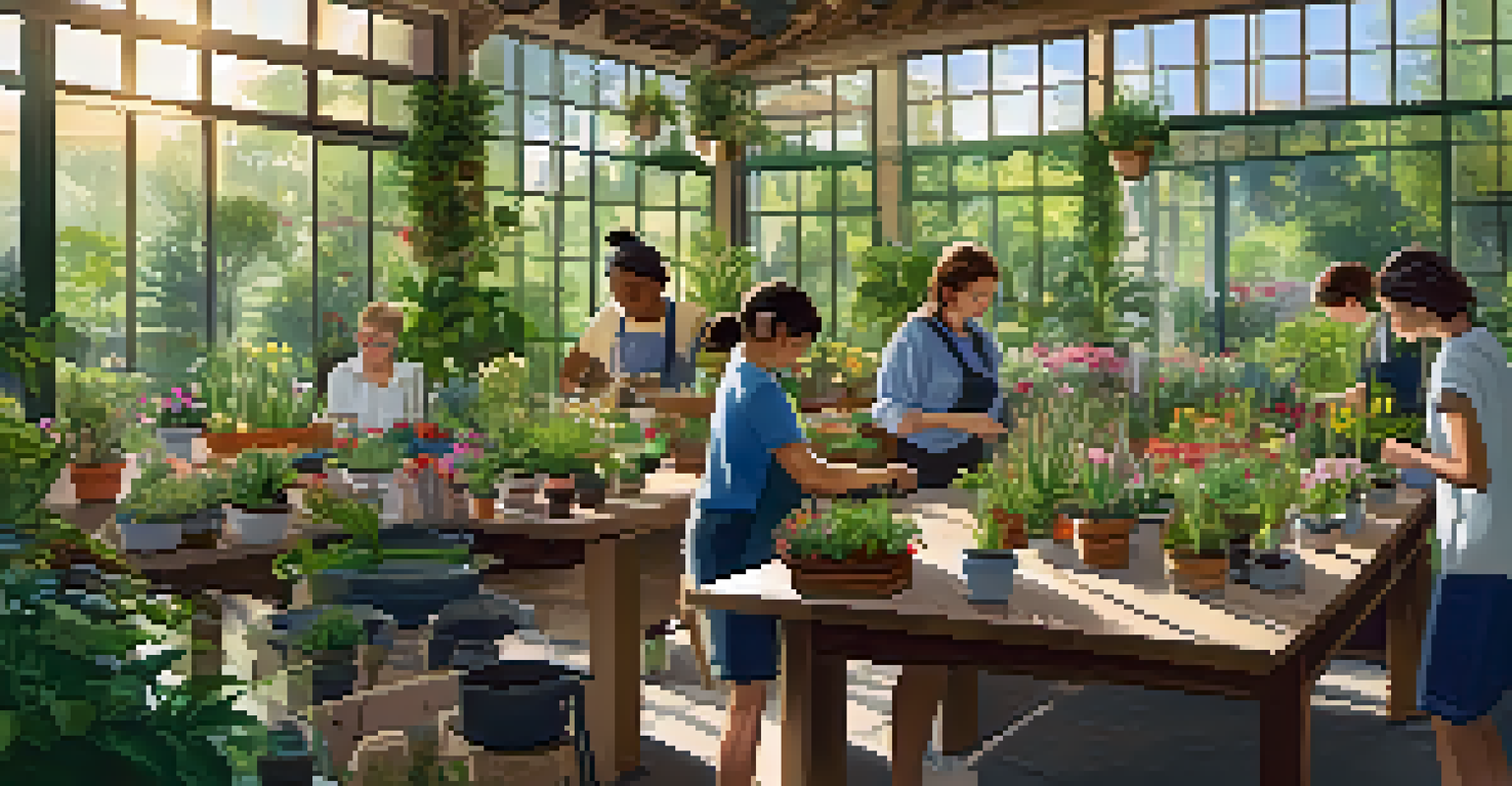The Role of Botanical Gardens in San Diego's Ecosystem

Understanding Botanical Gardens and Their Purpose
Botanical gardens serve as living museums, showcasing a diverse range of plant species. They play a crucial role in conservation, education, and research, providing a space for visitors to connect with nature. In San Diego, these gardens are not just beautiful landscapes; they are vital ecosystems in their own right.
The best time to plant a tree was twenty years ago. The second best time is now.
Visitors can explore various plant communities, from tropical rainforests to desert landscapes, each contributing to a deeper understanding of biodiversity. By highlighting the importance of native and endangered plants, these gardens foster a sense of responsibility towards conservation. They also serve as centers for scientific research, helping to uncover the mysteries of plant biology.
Ultimately, botanical gardens are much more than aesthetic spaces; they are essential for environmental awareness and sustainability. They inspire individuals to appreciate the natural world and understand the importance of preserving it for future generations.
Promoting Biodiversity in San Diego's Ecosystem
Biodiversity refers to the variety of life forms in a given area, and botanical gardens significantly contribute to this diversity. In San Diego, these gardens cultivate a wide range of plant species, many of which are native to California. This not only supports local wildlife but also helps maintain the health of the ecosystem.

By planting native species, botanical gardens create habitats for various pollinators, such as bees and butterflies. These gardens also serve as sanctuaries for birds and other wildlife, enhancing the overall ecological balance. The presence of diverse plant life fosters resilience against pests and diseases, making the ecosystem more robust.
Botanical Gardens as Biodiversity Hubs
These gardens play a crucial role in promoting biodiversity by cultivating native plant species and creating habitats for local wildlife.
In essence, botanical gardens act as a refuge for biodiversity, playing a key role in preserving the natural heritage of San Diego. They demonstrate how urban areas can coexist with nature, encouraging sustainable practices that benefit both people and the planet.
Education and Community Engagement Through Gardens
One of the most significant roles of botanical gardens is their commitment to education and community involvement. In San Diego, these gardens offer workshops, guided tours, and volunteer opportunities that engage the public. This hands-on approach helps individuals learn about ecology, horticulture, and conservation efforts.
Nature does not hurry, yet everything is accomplished.
Schools often utilize botanical gardens as outdoor classrooms, providing students with practical experiences that complement their studies. This interaction fosters a sense of stewardship, encouraging young people to care for their environment. By educating the community, botanical gardens promote a culture of sustainability and ecological awareness.
Moreover, these gardens often collaborate with local organizations to host events that celebrate nature and biodiversity. Such initiatives not only enrich the community's knowledge but also strengthen connections among residents, creating a shared commitment to preserving the natural world.
Conservation Efforts Supported by Botanical Gardens
Conservation is at the heart of botanical gardens' missions, particularly in regions like San Diego, which face environmental challenges. These gardens participate in various conservation programs aimed at protecting endangered plant species. By cultivating and propagating rare plants, they contribute to efforts that restore ecosystems and prevent extinction.
Botanical gardens also play a role in seed banking, where seeds from threatened species are stored for future use. This is crucial for maintaining genetic diversity and ensuring that these plants can be reintroduced into their natural habitats. The work done in these gardens is a testament to the importance of preserving our planet's biodiversity.
Education and Community Connection
Botanical gardens engage the community through educational programs and workshops, fostering a culture of environmental stewardship.
Through these conservation efforts, botanical gardens not only safeguard plant species but also educate the public about the importance of protecting our ecosystems. Their initiatives inspire collective action and highlight the role each individual can play in conservation.
The Role of Botanical Gardens in Climate Change Mitigation
As climate change continues to affect ecosystems worldwide, botanical gardens are stepping up to address these challenges. By studying how different plant species respond to changing climates, these gardens become vital research hubs. They investigate which plants may thrive under new environmental conditions, providing insights that can guide future conservation efforts.
Additionally, botanical gardens promote sustainable practices such as water conservation, composting, and organic gardening. By showcasing these methods, they encourage visitors to adopt similar practices in their own homes. This grassroots approach to sustainability can have a significant impact on reducing the overall carbon footprint.
In this way, botanical gardens not only adapt to climate change but also actively combat its effects. They serve as examples of how humans can coexist with nature while mitigating the impacts of environmental change.
Enhancing Urban Green Spaces and Quality of Life
Botanical gardens enrich urban areas by providing green spaces that enhance the quality of life for residents. In densely populated cities like San Diego, these gardens offer a respite from the hustle and bustle, allowing people to connect with nature. They serve as peaceful retreats where individuals can relax, unwind, and rejuvenate.
These green spaces also contribute to mental and physical well-being, as studies have shown that spending time in nature can reduce stress and improve mood. By providing recreational opportunities, such as walking trails and picnic areas, botanical gardens encourage a healthier lifestyle. They foster community interactions, bringing people together in a shared appreciation for nature.
Conservation and Climate Action
By participating in conservation efforts and studying plant responses to climate change, botanical gardens contribute significantly to ecological resilience.
Moreover, urban green spaces help improve air quality and reduce the urban heat island effect. By planting trees and other vegetation, botanical gardens play a crucial role in creating a healthier urban environment, benefiting both residents and local wildlife.
The Future of Botanical Gardens in San Diego
Looking ahead, the future of botanical gardens in San Diego holds great promise as they continue to evolve. With increasing awareness of environmental issues, these gardens are likely to expand their roles in education and conservation. They will serve as essential resources for communities seeking to understand and combat climate change.
Innovative projects, such as vertical gardens and sustainable landscaping, may also emerge, showcasing how urban spaces can be transformed into green havens. This adaptability will keep botanical gardens relevant and engaging for future generations. As they embrace new technologies and methods, they will inspire individuals to take action towards environmental stewardship.

Ultimately, the future of botanical gardens in San Diego is intertwined with the health of our planet. By fostering a culture of sustainability and awareness, these gardens will continue to play a vital role in preserving the region's rich biodiversity and enhancing the quality of life for all.